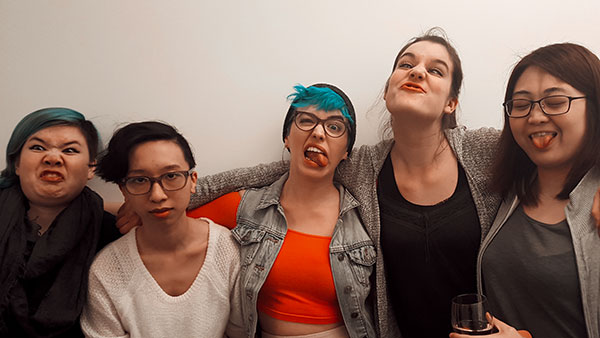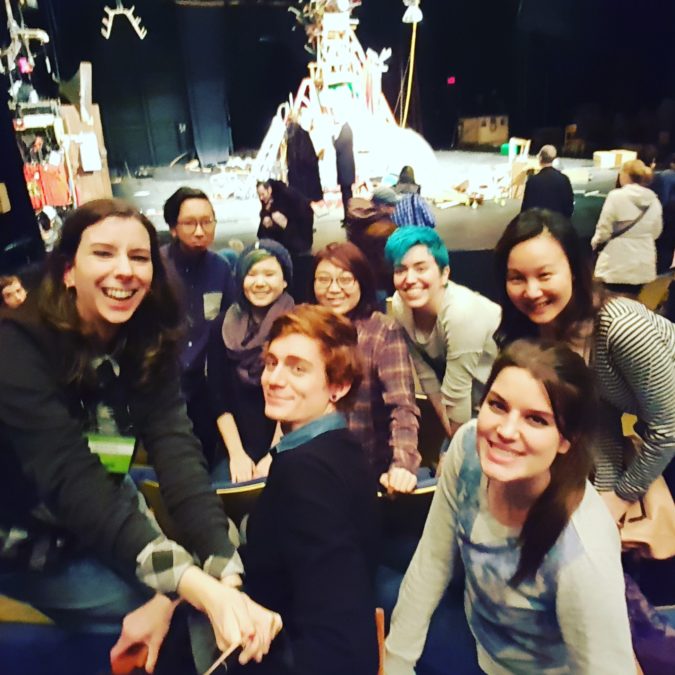PuSh Youth Academy reflect on the 2016 PuSh Festival
March 03, 2016

The PuSh Festival is over for another year, but our newest and youngest patrons, the PuSh Youth Academy, will have the last word. Read on to find out what Celina, Joyce, Megan and Nathan (four out of seven Academy members) thought of their favourite performances. Interviewed by Emily Neumann, Youth Coordinator.
Emily Neumann: What were your top two shows?
Joyce: My top two picks in the youth program were Jack Charles V. the Crown and L’immédiat. Both of these shows were packed with people; the social factor of a room full of people just instantly makes a show better from a personal standpoint.
Megan: Leftovers – Bringing together political comedy and personal history, Charles Demers is a performer who knows how to inject a lesson in socialism with heart and bleary-eyed optimism. A timely show amid the still fresh fervor of Justin Trudeau’s prime ministerial appointment, Demers takes on the past, present, and future of social change with wit and humour. Masterfully weaving his own familial story in and out of a canon of political revolutionaries, Leftovers is leftism, laughter, loss, and love.
L’immédiat – Combining techniques of slapstick humour and deadpan delivery, L’immédiat is physical theatre with a side of Withnail and I—dark and chaotic, but obsessed with the struggle. The piece makes no effort to conceal the numerous possibilities for failure, breaking the fourth wall by exposing the mechanics behind the set and its design and playing off of the self-reflexive openings that this risk provides. Transforming props and using the body in ingenious ways, the performers in L’immédiat tell a story of which ambiguity and fluidity is its lifeblood.
Celina: Leftovers and Vu, but I loved all the ones we saw.
Nathan: Leftovers and L’immédiat.
EN: What did you learn from these shows?
Joyce: Through watching these shows I have learned that theatre can be a space to express social issues like multiculturalism, GLBTQ issues, drug addictions, etc. Though theatre may not be the safest place to express these issues it is certainly a space that would have the least consequences when these issues are being voiced out/delivered.
Megan: As someone preoccupied with meaning, I’ve learned that finding meaning isn’t always necessary or productive when analyzing performing art. A lot of the performances that I saw at the PuSh Festival this year were difficult to explain beyond their powerfully affective qualities. I’ve also learned to dissuade myself from assigning merit to performance based less on production value or skill, and more on intention.
Celina: I learned how important a sense of humour reeeeally is to me. I know now that it’s something I look for and appreciate, which I wasn’t aware of before.
Nathan: I learned more about the power of theatre’s liveness. Many of the shows we saw used audience interaction as well as spatial interaction both on and off stage to great effect. As an audience member, I felt drawn into the performances in a way that would not have been possible with film or other more passive mediums.

EN: What do you think Vancouver has to say about its art scene? What about other cities?
Joyce: The art scene in Vancouver is quite diverse and experimental compared to many other countries I know of. I also enjoyed how each show offered a diverse selection of art disciplines (i.e. Visual art, dance, theatre, music, film). The shows we watched almost never solely focused on just one art discipline. All shows incorporated some sort of musical elements in the show, which I appreciated.
Megan: As I have become a more active participant in Vancouver’s art scene, I have come to appreciate the risks that a lot of the city’s artistic programming engages in. Plenty of international artists now see, to be performing or exhibiting works in Vancouver and I think this has a lot to do the emphasis on community and inclusivity that art institutions and organizations in this city encourage. I also see public art initiatives becoming an established part of the urban and cultural landscape, introducing art appreciation to a wider audience, and engaging socially relevant issues in accessible ways.
Celina: I think Vancouver is a very strange place with a lot of different things going on. Thanks to PuSh, we saw ancient forms of theatre, like circus, continuing to thrive with modern audiences. But we also saw completely experimental pieces that strayed from one specific craft to tell us very common stories that are happening all around us, like Miss Understood, in a way that seems to dare us to actually notice them. I’m not sure about other cities, but I’m excited to travel and see more!
Nathan: I think every city’s art scene has specific things to say as reflections on daily life in that particular city. In Vancouver, social issues are bound to come up a lot, issues such as homelessness, unaffordable housing, treatment of indigenous peoples, and issues of environmental conservation. To varying degrees, Miss Understood, Leftovers and Jack Charles V. the Crown addressed some of these issues that impact us locally. However, all of the shows have messages that pertain to a more general audience in any city in the world. Though the nuances of Vancouver’s locale colour our perception of the works, others in different cities will view these pieces in a different light, though that light would be no less powerful or important.
EN: Any through-lines? Overarching themes?
Megan: Of the shows seen with the PuSh Youth Academy, there were a number of recurring themes. From Jack Charles V. the Crown and Miss Understood, I took away from their personal stories a very important recounting of trauma, resilience, and transformation. Transformation was, in turn, also present in Vu, Leftovers, and L’immédiat—the possibilities of thought and imagination to transform quotidian life or to destabilize the status quo were exciting.
Celina: It would seem to be “the common made extraordinary,” but I’m not entirely sure. I think art is less about making everyday plights theatre-worthy, and more about showing us how beautiful it already is. Or funny. Or tragic. Or all of the above.
Nathan: The overarching themes were definitely in personal narratives, L’immédiat excepted. Leftovers, Jack Charles and Miss Understood all communicated personal stories in a very intimate way.
EN: What is the value of performing arts? Especially through a youth lens?
Joyce: As a music student, I always highly valued live performing art. In the past I’ve always enjoyed live performances as there is always something magical about it. Seeing a show live and seeing a show that is recorded is completely different. As I’ve mentioned before the social factor plays a role as well as being present in the moment is also something that cannot be recreated in another time/space. Overall, I feel that all the shows that have been picked for the youth program were all very well made.
Megan: Performance is incredibly valuable, not just in the emancipatory possibilities of art, but also as a medium with the potential to disseminate socially relevant issues, impart knowledge, and represent a diverse range of stories and experiences that not all individuals may be privy to their daily lives. For youth especially, performing art can be a safe outlet for expression and a comfortable space for self-exploration.
Celina: They all made me think! So, great success! I think the greatest gift an artist can give us is the gift of wonder. I’m sure it’s a quote I’m stealing from someone much smarter than I, but it’s true. I walked away from every show in stunned silence. Youth need access to the kinds of experiences you can only get from live performance. And who knows? We could be informing the next generation of thinkers and doers and makers and dreamers. So it’s worth it to do the best we can. Because it is worthwhile.
Nathan: Performing arts, as indeed any art form, have the capacity to communicate with an audience about the world that we live in today. Ideas and issues (political, social, economic) can be addressed and brought to our attention in a unique way in the arts, allowing the audience to think about their world in a way that they might not have before, to consider new ideas and concepts. In terms of youth specifically, performing art provides a release both for young audience members and young artists. Being able to creatively express ideas, thoughts and frustrations is invaluable, and it allows for young people to learn how to communicate and express themselves in the world.
EN: Based on the Youth Academy’s list of likes/dislikes about performing arts, assign some of those qualities to shows we’ve seen:
Celina: Oh man! This one is so hard! I liked the shifts from personal to historical to hilarious in Leftovers. I felt like the pace kept up and Charlie Demers is just so so so hilarious that he almost dares you to tune out the politics but knows you won’t because it’s just so well written. I think they all had a point to them, even if the point was simply to be entertained.
Nathan: I don’t think that any of the shows that we saw at Push were “bad” shows (i.e. having more in common with the “dislikes” side than the “likes”). I think that each show contained elements of complexity (no hand-holding), specificity (their creative choices were intentional and not lazy) and relevance (contemporary ideas and thoughts) in their expression. I do think that perhaps Miss Understood could have been less obviously dramatic; some of the projections and scenes were a little over the top and perhaps unnecessary given that the gravity of the piece was conveyed very well through the dramatic nature of the dialogue. L’immédiat possessed several great qualities, such as the possibility for failure and elements of spontaneity (even though they were rehearsed), but I felt that it was perhaps too ambiguous in its meaning with its disjointed scenes that seemed to have little relation to each other.